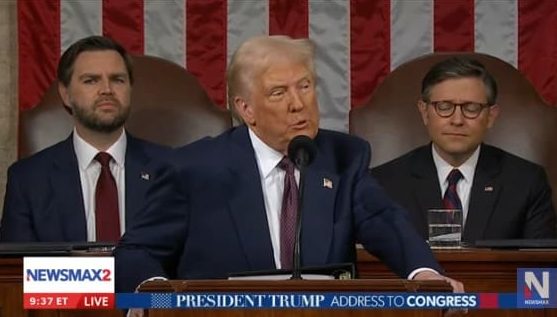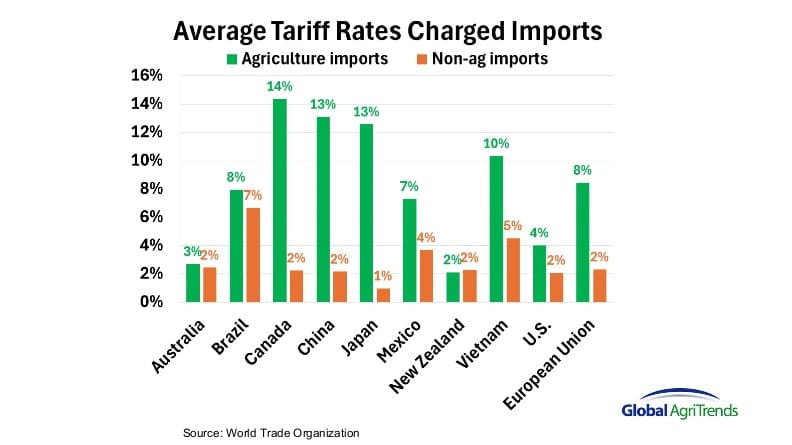
President Trump spruiks to the US Congress today.
UNITED States president Donald Trump doubled down on his intention to impose tariffs on all agricultural imports from 2 April during his first address to a joint sitting of the US Congress today.
Mr Trump yesterday posted a tariff warning on his private social media platform to encourage American farmers to start making a lot of product to be sold domestically.
“To the great farmers of the United States: Get ready to start making a lot of agricultural product to be sold INSIDE of the United States. Tariffs will go on external product on April 2nd. Have fun!” Mr Trump posted.
America is Australia’s largest market for lamb, beef and goat meat, yet Australia currently imposes no tariffs on American agricultural products, and the Albanese Government is continuing to make the case for no tariffs on Australian ag products.
No further details of the proposed tariffs or how they might impact Australian lamb, beef and goat meat exports to the United States are available, but in his first address to the US Congress since he was elected, Mr Trump said under his trade policy nobody would be able to compete with American farmers.
Mr Trump said agricultural products coming into America from other countries were “uninspected, they may be very dirty and disgusting and they come in and they pour in and they hurt our American farmers.”
“The tariffs will go on agricultural product coming into America … our farmers starting on April 2nd.
In reference to a trade agreement made with China during Mr Trump’s previous term in 2020 that he claimed would “boost American agriculture by $50 billion every year,” the US president today claimed: “There may be a little bit of an adjustment period, we had that before when I made the deal with China, $50 billion dollars of purchases that I said just bear with me and they did, they did, probably have to bear with me again,” he said.
“This will be even better, that was great, the problem with it was that Biden didn’t enforce, he didn’t enforce it, $50 billion dollars of purchases that we were doing great but Biden did not enforce it and it hurt our farmers.
“But our farmers are going to have a field day right now, so to our farmers ‘have a lot of fun, I love you too, I love you too.”
Mr Trump’s initial post came after he confirmed that 25pc tariffs on goods from Canada and Mexico will start today. He also announced additional tariffs on China, for which China has promised to retaliate.
Trade Minister Don Farrell told Sheep Central today that the Albanese Government has been working hard to advocate for Australia’s interests, including maintaining free and fair trade between Australia and the United States, which benefits both our countries.
“Aussie farmers produce world class, exceptional goods which are in high demand, and in producing these goods, many of our farmers utilise US agricultural technology and products,” he said.
American farmer action to impose tariffs on imported lamb has been building for some time, and the American Sheep Industry Association’s president Ben Lehfeldt told the US Senate’s Committee on Agriculture on 26 February 26 that the US lamb market at the wholesale level has been stagnant for the past year and any uptick is quickly dampened by the surge in imported lamb from Australia and New Zealand. Portions of the trade have witnessed a one-third jump in volume of 2024 over 2023, he said.
“Importers are taking full advantage of the US currency exchange that favors imports, hurting our domestic prices and exports.
“ASI has engaged a legal firm specializing in international trade twice in four years and is discussing a third investigation with our board of directors this winter,” Mr Lehfeldt said.
“We ask the committee’s support for our efforts with trade officials of the Trump Administration to gain a measure to counter act the surge in foreign meat.”
Before Mr Trump published his ag product tariff post, RaboResearch general manager Australia & New Zealand Stefan Vogel said the new administration in the US could decide to impose duties on imports of any kind of product as seen in the past e.g. with steel.
“However, in the case of lamb, imports provide the majority of US lamb and mutton supplies with Australia being a key supplier alongside New Zealand.
“It would be more than likely that any duty imposed would be passed on to the consumer in the form of higher prices and at a time of historically high retail beef prices and economic uncertainty this may not be politically palatable,” he said.
“For now, we don’t expect the US ‘Fair and Reciprocal Plan’ to bring much change for Australian lamb.
“There is no duty on US sheep meat imports into Australia — Australia’s sheep meat imports are very small if any — and therefore we do not believe there is any argument to impose reciprocal tariffs.”
What do Australia’s ag analysts think?
Episode 3 analyst Matt Dalgleish said the uncertainty the US tariff situation and the market volatility is almost as bad as the idea of a 25pc tariff on Australia’s red meat exports. He said there has been analysis by the Peterson Institute for International Economics that indicated the Trump tariffs would be inflationary domestically.
Mr Dalgleish said an impact of tariffs on Australian lamb, beef and goat meat into America could be increased prices for US consumers and there were already US farms and ag businesses that were starting to feel the negative impacts of the Trump tariff and immigration policy.
Global AgriTrends analyst Simon Quilty said it is difficult to comment with the uncertainty of the situation, but he expected there would be a lot of discussion behind the scenes between Australia and US officials before 2 April.
“So watch this space.
“What we know in our favour is the cost of imports, in terms of tariffs we put on thing coming in, is lower than the US.”

According to a World Trade Organisation analysis, Mr Quilty said Australia’s average ag imports tariffs are calculated at 3pc, compared to 4pc for products entering the US. If import tariffs are to be based on reciprocity, it could be argued that Australia is “not unfair”, he said.
According to US livestock analyst Len Steiner’s daily livestock report, futures were reacting to the “extreme uncertainty”.
“In 2024, U.S. beef exports to Mainland China accounted for 16pc of total beef shipment volume. Including Hong Kong, the total share was 19pc,” Mr Steiner said.
“Canada and Mexico will clearly have a bigger impact. Between cattle and beef imports from these two countries, tariffs have the potential to affect nearly 12pc of US beef consumption.”
His report said some more deadlines are coming.
“There is a federal notice requesting comments on unfair trade practices, with a deadline of March 11. Additionally, on January 20, President Trump sent a memo to various federal agencies, directing them to report back by April 1 on measures needed for a more balanced trade relationship with various countries,” Mr Steiner said.
“A new federal agency, the External Revenue Service, may be in the works to collect and manage taxes on imports.”
Australian industry keeping a watching brief
The possibility of a tariff on Australian agricultural products has been on the cards for some time, with Australian beef industry leaders forming a working group to keep a brief on the Trump administration’s moves.
Some have raised Australia’s trade surplus with the United States as a possible avenue to negotiate tariffs that might be imposed on Australia.
- Andrew Whitelaw from EP3 wrote this item yesterday about the potential tariffs.


Passed onto consumer. That won’t happen, we are the price takers. We have seen in the last couple of years the $20-$50 dollar price fluctuations when the numbers are higher from week to week. Take this week, Horsham was 20 dollars better on mutton as the numbers were back Monday and Tuesday. And Wagga’s numbers were going to be back as well. As for tariffs, I would imagine the American farmers are still getting subsidised.